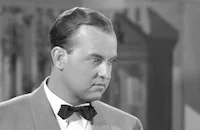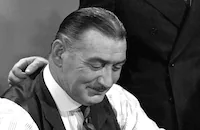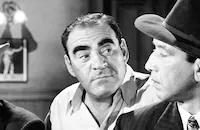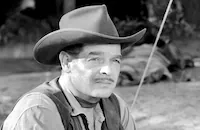Alexander's Ragtime Band

Brief Synopsis
Cast & Crew
Henry King
Tyrone Power
Alice Faye
Don Ameche
Ethel Merman
Jack Haley
Film Details
Technical Specs

Synopsis
In San Francisco, classical violinist Roger Grant performs at a society Nob Hill string quartet recital. Roger's Aunt Sophie and his teacher, Professor Heinrich, predict he will be a great musician. Following the recital, Roger goes with three other musicians, pianist Charlie Dwyer, drummer Davey Lane and Louis, a clarinetist, to audition at "Dirty Eddie's," a Barbary Coast saloon, which is looking for a band. Upon discovering that their music is missing, the bartender, Bill Mulligan, gives them sheet music that was left on the bar by prospective singer Stella Kirby, which she received from a friend in New York. Stella has raved that nothing like the piece, which has an unusual time and rhythm, has been heard on the Barbary Coast before. When she hears the song, Stella, thinking that the band stole it, joins them and sings. The song, "Alexander's Ragtime Band," written by Irving Berlin, greatly pleases the patrons and owner, who hires the band and Stella, and dubs Roger "Alexander." Although Stella is still miffed, Charlie convinces her to remain with the band. Roger, adopting his new name, fulfills his desire to have his own band, which grows in size, but Aunt Sophie and Professor Heinrich are disappointed in him. As the band plays in increasingly classy places, Roger, who says he wants to set the world on fire, constantly quarrels with Stella, who only wants a job, and Charlie acts as conciliator. Before the opening of the exclusive Cliff House, Charlie plays a romantic song for Stella, which he wrote for her, and as she sings it during the performance, she and Roger, in a glance, realize that they love one another, which Charlie painfully sees. When Charles Dillingham, a top New York producer, asks Stella to come to New York, where, he says, he can make her a star, Roger, rather than joining Stella's and Charlie's delight, argues against the move. After Roger orders Stella to leave, Charlie, who philosophically accepted his friends' romance, quits also. During World War I, Roger and Davey convince a colonel to allow them to put together a show to run on Broadway to rival a Navy revue. Stella tries to visit Roger backstage, but he refuses to see her, and when a transport order interrupts the show and he marches with the others to the docks, she cries. After the war, Roger visits Stella, now a star, during a rehearsal and, after asking her forgiveness and confessing that he has never stopped loving her, learns that she and Charlie have been married for more than a year. Depressed, Roger joins Davey and singer Jerry Allen in a new band. One year later, Charlie and Stella run into Bill Mulligan, now a bootlegger, and learn that Roger is playing in Greenwich Village. Realizing that Stella still loves Roger, Charlie proposes an amicable divorce. Stella goes to the club, and although she and Roger exchange loving glances, when she learns that Jerry was responsible for getting him out of his depression and that the band is sailing for Europe the next day, she refrains from approaching him. While in Chicago on tour, Stella quits and disappears. In London, Roger proposes to Jerry, but knowing that he does not love her, she turns him down. When Roger returns to New York and auditions songwriters for his new radio program, Charlie comes and reveals the divorce and tells Roger that Stella still loves him. Stella, who has been performing in cabarets under an assumed name, arrives in New York just as Roger's Carnegie Hall swing concert, which Aunt Sophie and Professor Heinrich proudly attend, is about to begin. Stella finds Bill, now in his own restaurant, but refuses to accompany him to the hall. While Bill secretly arranges for Roger to meet Stella after the show, she leaves the restaurant and takes a taxi through the park listening to the concert on the radio. When the driver pulls up outside Carnegie Hall, Stella attempts to purchase a ticket, but learns that the show is sold-out. The taxi driver invites her back to hear the rest of the concert, but as Roger is about to introduce "Alexander's Ragtime Band" as his encore, she cries and requests the driver to turn the radio off. He refuses and after she hears Roger say that he is playing the song for the one person with whom he associates it, the driver reveals that he knew her identity all along. Emotionally overcome, Stella goes backstage. Bill finds her and brings her to the wings, where Charlie notices her and attracts Roger's attention. He embraces her and brings her on stage, where she joins the band in the song.

Director
Henry King
Cast

Tyrone Power

Alice Faye

Don Ameche

Ethel Merman

Jack Haley

Jean Hersholt

Helen Westley

John Carradine
Paul Hurst
Wally Vernon
Ruth Terry

Douglas Fowley
Chick Chandler

Eddie Collins

Joseph Crehan
Robert Gleckler
Dixie Dunbar
Joe King
Charles Coleman
Stanley Andrews
Charles Williams
Jane Jones
Otto Fries
Mel Kalish
Selmar Jackson

Donald Douglas

Grady Sutton
Tyler Brooke
Arthur Rankin
Jack Pennick
Cully Richards
Charles Tannen

Lon Chaney Jr.
Paul Mcvey
Kay Griffith
Lynne Berkeley

Edward Keane
Edwin Stanley
Sam Ash

Ralph Dunn

James Flavin
Harry Tyler
Albert Morin
Edward Mundy
Alex Pollard
James C. Morton
Eleanor Wesselhoeft
Pop Byron
Fredric Santley
Ron Wilson
Richard French

Robert Lowery
Joe Cunningham
Stanley Taylor
James Gordon
Joan Castle
Helen Ericson
Elizabeth Palmer
Dorothy Dearing
Harold Goodwin
Cecil Weston
Crew
Irving Berlin
Irving Berlin
Harry Joe Brown
Seymour Felix
Sheridan Gibney
Roger Heman
Bernard Herzbrun
Arthur Von Kirbach
Boris Leven
Thomas Little
Peverell Marley
Charles E. Mccarthy
Barbara Mclean
Alfred Newman
Frances Richardson
Kathryn Scola
Richard Sherman
Lamar Trotti
Gwen Wakeling
Al Wark
Robert Webb
Henry Weinberger
Darryl Zanuck
Darryl F. Zanuck

Photo Collections
Film Details
Technical Specs

Award Wins
Best Score
Award Nominations
Best Art Direction
Best Editing
Best Song
Best Writing, Screenplay
Articles
Alexander's Ragtime Band
Music is indeed ever-present in Alexander's Ragtime Band. With 29 Irving Berlin songs dating from the 1911 title tune up to three brand-new songs written for this picture, Alexander's marked the first time a feature film showcased a songwriter's repertoire to such a deep degree.
Fox studio chief Darryl Zanuck wanted the film to be an actual biography of Irving Berlin, but Berlin wouldn't allow it. Instead he consented to a loose, fictionalized biography in which the songs would track the time span of the story being told, with a love-triangle surface plot holding it all together. While Berlin's name is not mentioned in any dialogue, his name does appear above the title of the film -- an unusual perk he negotiated with Zanuck, and one which underscores the notion that non-directors, in this case a songwriter, can sometimes dominate a movie's flavor to such an extent that they are arguably the real "auteur" of that film.
Be that as it may, Berlin's music is brought to the screen here with the help of a powerhouse cast -- Alice Faye, Tyrone Power and Don Ameche -- plus a top studio director, Henry King, whose other credits include Jesse James (1939), The Black Swan (1942) and The Gunfighter (1950). This was a genuine A-level production for 20th Century Fox.
The three stars and director King had all just worked together on In Old Chicago (1937) and were happy to team up again. King called the actors his "happy trio" and kept photos of them in his office for years afterward. He and Faye both later named Alexander's Ragtime Band as their favorite picture of their careers.
Berlin, too, was delighted to have Faye singing several of his songs. She was such a favorite of his that in 1940 he said, "I'd rather have Alice Faye introduce my songs than any other singer" -- high praise indeed, and few would have disagreed. While Faye is sadly not too well remembered today by the general public, she was a huge star at the time, and the warmth and likability she radiated off the screen has seldom been matched.
One of her songs here is among the three that Berlin composed just for the film: "Now It Can Be Told." When he finished writing it, a few months before production began, he predicted, "If there ever was a chance for a song being a big hit, this is it." He was right -- it reached #2 on the pop charts and was nominated for an Oscar®.
Berlin and Faye reinforced each other's star power. They contributed greatly to each other's success, with Berlin part of the process even through Faye's rehearsals. Faye later recalled Berlin's regular presence on the set: "Sometimes he'd just sit and watch. Sometimes he'd play and sing his songs to help me get their feeling."
Also in the cast is stage and screen star Ethel Merman, who performs "My Walking Stick" (another of the new songs) in men's top hat and tails, a la Fred Astaire. In fact, Berlin had written the song for the Astaire-Rogers film Carefree (1938), but Astaire nixed it because it was too similar to the number he had done in Top Hat (1935). Merman had previously worked with three of her Alexander's co-stars: with Ameche on the film Happy Landing (1938), with Jack Haley on the Broadway hit Take a Chance, and with Faye on the stage version of George White's Scandals, at which time Faye had been a chorus girl and once borrowed ten dollars from Merman. Now Faye was the bigger star -- at least in the movies.
While making Alexander's Ragtime Band, Faye planted her footprints in the cement of Grauman's Chinese Theater, a symbol of her star power. Her success, however, was straining her young marriage to Tony Martin. They had only been married a few months, and he was still struggling to get a foothold in his career. They took a delayed honeymoon when production on the movie wrapped, but cut it short. Within two years, they'd be divorced.
While Alexander's Ragtime Band was shot over three months in early 1938 and released that summer, it had been in preparation for two years and wound up costing Fox about $2 million, an extravagant sum. Nonetheless, it was a giant hit with audiences and critics alike, racking up six Oscar® nominations including Best Picture, winning the award for Best Score, and becoming one of the studio's most successful films of the era. (A 1947 rerelease proved even more lucrative, perhaps helped by the fact that Faye had recently retired from the screen.)
As a result of all this success, 23-year-old Faye received an outpouring of critical accolades, a salary raise to $2500 per week, and became the second-highest fan mail recipient on the Fox lot. Later she recalled: "Every girl in the world envied me. The truth is, I envied myself. I wished I could have shaken myself up and made myself more of an extrovert. I wished I could have been more of a party girl. But like the leopard with those damned spots, I couldn't change what I was -- or what I wasn't."
Henry King, who would go on to direct Faye a third time in Little Old New York (1940), had this to say about working with her: "Like most sensitive, talented people, she needed to feel she was doing it herself, not just aping a director's instructions. She always took direction beautifully without any show of temperament, and when you were done the character she played came across with a vibrant warmth of personality so many actresses did not possess."
Director: Henry King
Screenplay: Kathryn Scola, Lamar Trotti; Richard Sherman (adaptation); Irving Berlin (story); Sheridan Gibney, Darryl F. Zanuck (both uncredited)
Cinematography: Peverell Marley
Art Direction: Bernard Herzbrun, Boris Leven
Music: Irving Berlin; Alfred Newman (uncredited)
Film Editing: Barbara McLean
Cast: Tyrone Power (Roger Grant aka Alexander), Alice Faye (Stella Kirby), Don Ameche (Charlie Dwyer), Ethel Merman (Jerry Allen), Jack Haley (Davey Lane), Jean Hersholt (Professor Heinrich), Helen Westley (Aunt Sophie), John Carradine (Speakeasy Doorman/Taxi Driver), Paul Hurst (Bill Mulligan), Wally Vernon (Wally Vernon), Ruth Terry (Ruby), Douglas Fowley (Snapper), Chick Chandler (Louie), Eddie Collins (Corporal Collins), Joseph Crehan (Stage Manager), Robert Gleckler (Eddie), Dixie Dunbar (Specialty), Joe King (Charles Dillingham).
BW-106m.
by Jeremy Arnold
Sources:
Jane Lenz Elder, Alice Faye: A Life Beyond the Silver Screen
Caryl Flynn, Brass Diva: The Life and Legends of Ethel Merman
David Leopold, Irving Berlin's Show Business

Alexander's Ragtime Band
Quotes
Trivia
Notes
In the screen credits, the film is introduced as "Irving Berlin's Alexander's Ragtime Band." The Twentieth Century-Fox Records of the Legal Department at the UCLA Theater Arts Library contains a deposition given in 1944 by Darryl Zanuck, Vice-President in charge of production, regarding a plagiarism suit pertaining to this film. In the deposition, Zanuck states, "the idea of doing a picture called Alexander's Ragtime Band was my own idea," and then relates the following information about the origination of the film: During the production of the studio's 1936 film On the Avenue (see below), on which Irving Berlin wrote the score and collaborated on the story, Zanuck proposed making a film version of Berlin's life story, but Berlin rejected the idea for personal reasons. Zanuck writes that he then "schemed with a way of getting a portion of Irving Berlin's life on the screen, particularly his musical life" and approached Berlin with the idea of inventing a story that would have as its basis Berlin's most popular song, "Alexander's Ragtime Band," and could include certain incidents from his life "without violating his private life," because the main character would be fictitious. Berlin, according to Zanuck, was enthusiastic, and said, "We can make this man a combination of Paul Whiteman, George Gershwin, Irving Berlin, anything that we want." (Bandleader Whiteman abandoned a career as a classical musician after he was seduced by the performance of a jazz band in a San Francisco club. On February 12, 1924, his orchestra gave a concert in New York's Aeolian Hall, a turning point for the acceptance of popular music, as the hall had previously been used only for classical music. For that concert, Whiteman commissioned Gershwin's "Rhapsody in Blue.") Berlin suggested that the proposed film open at the Barbary Coast in San Francisco, rather than on the Bowery, where he began his own career, and suggested that they use an episode from his life when he was a sergeant in the Army and put on a Broadway show entitled Yip, Yip, Yaphank. Berlin also proposed having the climax at Carnegie Hall. Berlin and Richard Sherman, a leading short story writer (who had written the story "To Mary-With Love," which Zanuck used as the basis for the 1936 Twentieth Century-Fox film of the same name) wrote the first draft summary at the end of 1936. Zanuck stated that although the basic story had been developed by this point, he and Berlin were not satisfied with the leading characterizations. In April or May 1937, Zanuck hired Sheridan Gibney, who had written for him at Warner Bros. Gibney worked for two or three months, but Zanuck and Berlin were still not happy with the characters, and the script was much too long and not "dramatically compact." Finally, Zanuck assigned Lamar Trotti and Kathryn Scola in the middle of 1937, and they were responsible for having the male lead come from an upper-class background and the female lead from the lower-class. Both Trotti and Scola, in testimony pertaining to the plagiarism case, stated that Scola came up with the idea to inject, in Trotti's words, "the story of Pygmalion and Galatea, the molding of a girl or a hunk of marble into a creation that he would fall in love with." The plagiarism claim, which was filed on behalf of St. Louis writer Marie Cooper Dieckhaus, who claimed that her unpublished novel Love Girl was plagiarized, was denied in 1946, according to Los Angeles Times.
According to Variety, Berlin supervised the "musical angles." New York Times noted that Berlin used his famous piano with a shifting keyboard (which now belongs to the Smithsonian Institution) at the Twentieth Century-Fox studio. A total of twenty-nine Berlin songs were included in the film, including three written expressly for the film, "Now It Can Be Told," "My Walking Stick" and "Marching Along with Time." Zanuck, in the 1944 deposition, stated that Berlin had to buy up some of the foreign rights to a number of his older songs. The title song, published in 1911, was Berlin's first big hit and is among sixteen songs on the ASCAP (American Society of Composers, Authors and Publishers) list of all-time popular hits. It was first performed publicly without lyrics at the opening night of the Folies Bergère's International Revue. Next, Berlin himself performed it with its lyric at the Friars Club Friars Frolic, but it did not become a hit until vaudeville singer Emma Carus included it in her act in Chicago. By the end of 1911 it had sold over two million copies of sheet music and had swept not only the United States but Europe also. Although music historians do not consider the song to be strictly a ragtime piece, they credit it with making ragtime a national craze.
This was Harry Joe Brown's first film as associate producer for Twentieth Century-Fox, according to Hollywood Reporter. Alfred Newman was borrowed from Samuel Goldwyn, according to Hollywood Reporter and the film's pressbook, which also states that eighty-five separate sets were used. Trotti, in the legal records, states that director Henry King went to San Francisco and shot plates for process shots at the Cliff House. The pressbook states that glass cut in Czechoslovakia were used for the chandeliers in the Cliff House set, which was duplicated in Culver City. The film reportedly cost between $1,200,000 and $2,275,000, and it had already grossed $3,000,000 by November 1938, according to New York Times. Zanuck, in the 1944 deposition, called the film one of his most successful pictures. The success of the film, according to a August 1938 Hollywood Reporter news item, prompted Zanuck to shelve the previously successful "formula" for the studio's musicals and plan to produce future musicals that would be backed by dramatic stories. In a 1949 interview, Alice Faye said this was her favorite role. According to modern sources, Henry King called this film his most enjoyable. In her autobiography, Ethel Merman complained that the original lyric to "Heat Wave," "She started a heat wave by letting her seat wave," was changed for the film to "She started a heat wave by letting her feet wave."
The film had a preview on May 24, 1938 in Los Angeles, which New York Times noted was given "with all the folderol of a premiere; it was very, very formal, with lots of klieg lights and a grandstand full of fans." The film was not officially released until August 19, 1938. It was greatly praised by the trade press. Hollywood Reporter called it "a turning point of the industry and a new trend in the utilization of music in story telling." Motion Picture Herald, on the film's exploitation aspects, noted, "It announces itself in terms that every showman understands as the top musical comedy of all time, the easiest picture to exploit that has come out of Hollywood since Snow White and probably the most thoroughgoing and compelling demonstration of how to put showmanship into motion pictures that the trade has ever been treated to." A number of reviewers commented on the fact that although the film's story takes place over a period of twenty-seven years (from 1911 to 1938), the principal actors, Tyrone Power, Alice Faye and Don Ameche, show no signs of aging throughout the film. Alexander's Ragtime Band was voted third place in the Film Daily Seventeenth Annual Poll of the Critics of America, and received the Academy Award for Best Score (Alfred Newman). It was also nominated for five other Academy Awards: Best Picture, Original Story (Irving Berlin), Interior Decoration (Bernard Herzbrun and Boris Leven), Film Editing (Barbara McLean) and Best Song ("Now It Can Be Told" by Irving Berlin). According to Variety, when the film was re-issued in 1947, it did better at the box office than the first release. Lux Radio Theatre produced radio versions of Alexander's Ragtime Band with Alice Faye, Ray Milland and Robert Preston, which was broadcast on June 3, 1940, and with Tyrone Power, Dinah Shore, Al Jolson, Dick Haymes and Margaret Whiting, which was broadcast on April 7, 1947.

Miscellaneous Notes
Released in United States 1938
Released in United States 1938














